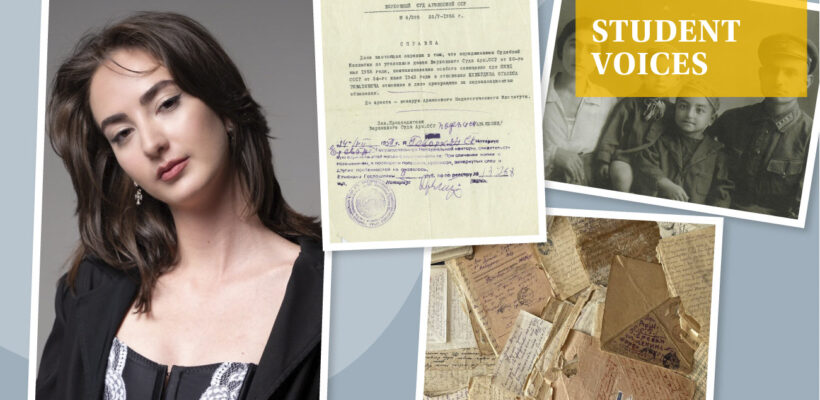
Mariam Avetyan (BAPG ’25): “This was a great opportunity to finally publish this important story”
3 min readIn 2023, Mariam Avetyan (BAPG ’25), a junior in the Bachelor of Arts in Politics and Governance program at the American University of Armenia, participated in the Eurasia Partnership Foundation’s “June 14” Literary Contest commemorating the Stalinist oppressions. Her essay submission (originally in Armenian) about her grandfather’s persecution won the second prize. Below, Mariam shares her grandfather’s harrowing story, with additional reflection on her family history and the significance of the contest.
Personal stories are valid documentary foundations upon which collective histories are constructed. This is my story: an oral chain of memories passed down through the generations of my family, yet its final vision remains elusive. The destiny of my grandfather, Hovhannes Hakhverdyan, lingers in my personal album to this day. The life of a diligent and scholarly man enriches the entirety of the Soviet years — an era marked by struggle and betrayal, him being labeled as a traitor to the nation, persecution, and the disruption of family ties.
On October 11, 1941, the NKVD, the Soviet government ministry responsible for security and law enforcement, came after Hovhannes Hakhverdyan, a former reservist and current lecturer. He used to live with his wife, Margo Saratikyan, and three sons: three-year-old Hovik, 13-year-old Norik, and 16-year-old Levon. The latter, a future doctor of philology, member of the Academy of Sciences, and author of many theater and literary books, was home alone with his father when the police arrived and forced Levon to sign the protocol. There are different conjectures as to why an educated ordinary lecturer was nominated for the charge of “traitor to the nation,” but there was no clear answer to the question of “why?”
After Hovhannes’ arrest, no one knew where he was: whether he was alive or shot in Armenia, or maybe in Siberia? The family wrote a short note and received a response only after several months: “I’m fine, in Yerevan prison [the number of the prison was deleted]. Please send me 10 kilos of bread…Yours, Hovhannes Hakhverdyan.” Grandma Margo had already prepared the bread and was on her way to find the prison when she got another note from the Central Bank: “….was exiled,” and still, no information as to his whereabouts. In the following years, Hovhannes found ways to communicate with the family, but his words didn’t tell as much as they covered: moving to construction work on the railway on the steppe, contracting malaria and not fully recovering, and so on. After completing the five years of exile, he was sent back to his family and passed away four months later from a number of illnesses that he contracted during his years in exile. My grandmother, Margo, went on to live for 83 years and experienced all the “goods” of Russian socialism: the expropriation of her father, a famous doctor in the village of Koti; the label “wife of a traitor to the nation;” the challenge of searching for food during the years of famine; the raising of three sons alone; the penalty of a brother who disappeared during World War II, and the responsibility of caring for her injured brother, as well as of her sister’s child.
This is my story, which also serves as a slice of Armenian history. I always wanted to gather all these historical documents and create an article about this tragic event that affected my family, when I finally came across an opportunity to do so. I wrote this essay for the Eurasia Partnership Foundation’s “June 14” Essay Contest, which was dedicated to the Day of Remembrance for the Oppressed. The contest promised to publish the winning pieces. The awards were announced last year, and my essay won the second prize. I was awarded a number of Armenian books, as well as a symbolic amount of money.
Only recently did the Eurasian Partnership Foundation publish the story of my family and shed light on this piece of history, something I had long awaited. I recount the story of struggle and betrayal that shaped the life of my grandfather, Hovhannes Hakhverdyan, through documents, letters, and the memories of friends. It had very long-lasting effects, and I am proud to be the first one, after all these decades, to combine all of this history into one story and publish it for the world to read.
|
Become a part of the AUA Student Voices series and tell us about your achievements, aspirations, and goals! Submit a write-up through our online submission form and tell us your story! Selected articles will be published on AUA Newsroom. |
